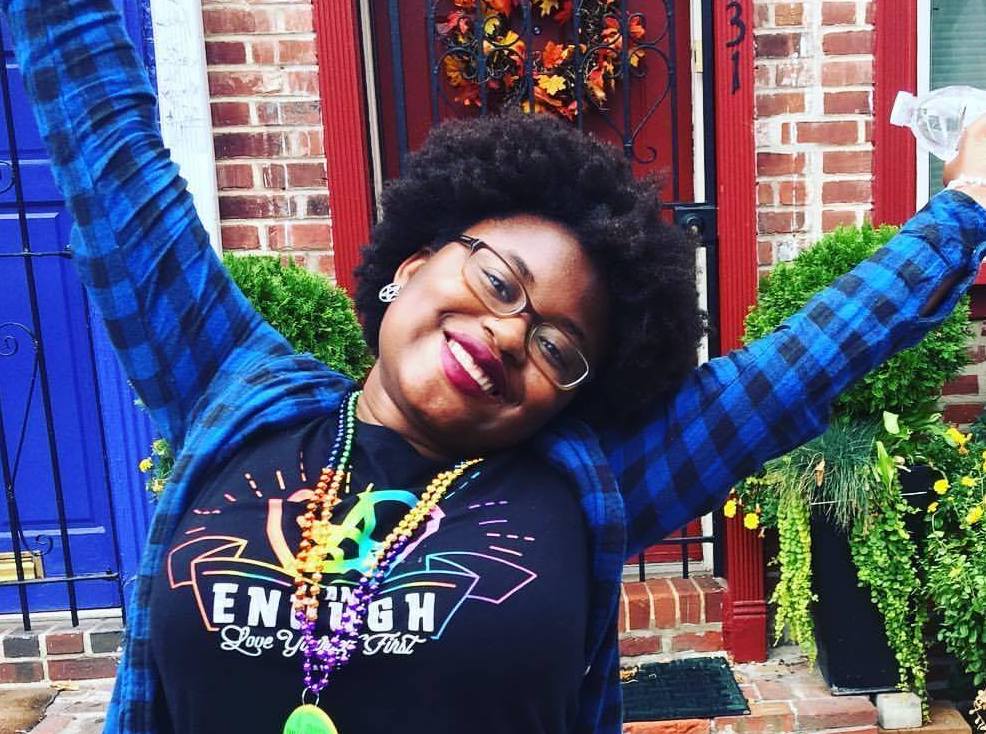By Emily Starbuck Gerson
When Shakira Monet grew up in New Jersey, she experienced some very early signs that she wasn’t like all the other girls at school. She loved comics and remembers being around 5 years old when she asked her dad if she could marry Wonder Woman.
However, Monet was raised in a religious Black family, and despite clear signals she was a part of the LGBTQIA+ community, being gay seemed beyond the realm of possibilities. This upbringing, combined with compulsory heterosexuality — the societal assumption that people are and should be straight — lead Monet to date men only.
Monet enlisted in the Air Force four years ago, and she poured herself into her career in patient administration. While she found serving fulfilling, her romantic relationships were not. Eventually, Monet acknowledged that she wasn’t ever going to be happy dating men. She broke up with her boyfriend in 2019 and came out as lesbian.
Finally, Monet found happiness in living authentically and dating women. While her family initially struggled with the adjustment, Monet ultimately found acceptance with her family and military community. She and her last partner planned to have a child together and got pregnant. While the relationship did not last, Monet is thrilled to be a mom to her son, Joshua, who will be born soon.
Through the process of being a single, pregnant lesbian mother, Monet has found just how heteronomative parenting resources are — in both the miliary and civilian world — but she’s working to change the system from the inside, and she’s confident that she and her son will successfully navigate solo parenthood.
Monet is currently stationed at RAF Lakenheath in England, where she’s involved in numerous diversity and inclusion efforts and will soon promote to Staff Sergeant. We spoke to Monet about her journey and why Black History Month is so important to recognize.
Modern Military Association of America: What was your experience coming out as lesbian?
Shakira Fox: It was a bit of a battle coming out, if I’m being honest. I always knew I was ‘some kind of queer’ ever since I was younger. I just could never quite put a label on it, though looking back, I realize I didn’t have to. My relationships have been primarily heterosexual due to me struggling with compulsory heterosexuality.
The Black community is known to be very religious and not always accepting of LGBT Black people. When I was growing up in a religious Black family, being gay was just not a thing, so I felt like I had to date men in order to be “normal” and not cause a rift in the family.
I felt that I had to suppress who I was to make my family happy in who I chose to be with. Unfortunately, it became so depressing keeping up the facade, and I was never happy or fulfilled in relationships with men. I was just going through the motions.
After I broke up with my last boyfriend in October of 2019, I knew it was time to finally live my truth. Coming out was relatively easy, I think I just posted a funny coming out meme on Facebook! My friends were very supportive, especially since they all kind of knew anyway.
My mom had a bit of a hard time with it, but she eventually came around. Now she makes lesbian jokes with me all the time! The downside to coming out was because I had previously dated men, some people tried to tell me I wasn’t really a lesbian or that I was just bisexual. But I started to live as the lesbian I always knew I was, and I haven’t been happier since!
MMAA: What led you to join the military, and what are some of the challenges you’ve faced as a lesbian Black woman in the military?
SM: I joined the military because I had a quarter-life crisis, true story! I was 25 years old, sleeping on my mom’s couch, living paycheck-to-paycheck with crappy jobs. I decided I needed a change in my life. I applied to speak with a recruiter from every branch and decided I would go with whatever branch called first. Thank goodness the Air Force called the next morning and that the Navy never called, because I sure can’t swim!
I’ve been in the Air Force for four years now and I work in patient administration. We run all sorts of different programs, but for the most part, I deal with making sure Tricare beneficiaries are enrolled into the overseas region and receiving the proper care, patient travel for medical TDY, and billing and claims for off-base care. There’s a lot more, but that’s the gist.
I actually haven’t had any challenges in the military when it comes to being a lesbian Black woman. I realize I’ve been incredibly lucky in that aspect that everyone has been accepting of my identity and I haven’t had any issues, military-wise.
MMAA: What are some ways you’ve worked to improve diversity and inclusion in the military?
SM: Although, so far, I haven’t had any issues with my identity as a lesbian Black woman in the military, I’m aware that other people like me do have issues, unfortunately. I want to do what I can to make sure my community is protected and not being treated any differently because of their identity.
That’s why I got involved with the Diversity & Inclusion committee on my base, and I became an admin for the Military LGBTQ+ for Enlisted Facebook group — so that I can advocate for my community better. I’ve been an admin for that group for nearly three years; it’s hidden, but if someone is interested in joining, they can send me a message on Facebook.
MMAA: As you navigate pregnancy as a single lesbian woman in the military, what has been your experience, and what could be improved?
SM: Being a pregnant lesbian is definitely an interesting experience! Base offers a lot of resources for parents such as New Parent Support Program, Bundles for Babies, Baby Basics, Village Friends, and Dad’s Class, just to name a few.
While they are extremely valuable resources, they are very heteronormative. The intake forms for the programs are very much geared towards heterosexual couples, as are the classes. I am actually working on getting the forms to be more inclusive so everyone feels welcome and supported in the process.
MMAA: What does Black History Month mean to you, and why is it so critical to commemorate it?
SM: Black History Month is very important to me; it’s been instilled in me since I was very young. Growing up in a predominantly white community and going to a predominately white school, we weren’t taught very much about Black history beyond the “safe” parts to teach, such as MLK Jr., Rosa Parks, etc.
My mother made it a point to teach me about all parts of my history, even the gruesome parts. Like any other special history month, it is important to commemorate these months to raise awareness to these communities, especially since history has been so whitewashed.
MMAA: What are some signs of progress you’ve seen in the military for the Black community?
SM: Diversity in leadership! It’s amazing and inspiring to see leaders of color in my chain of command. It makes me feel like it’s not a “good ol boys” club anymore and that if I choose to stay in the military, I can achieve my goals and not be held back because of my skin color.


